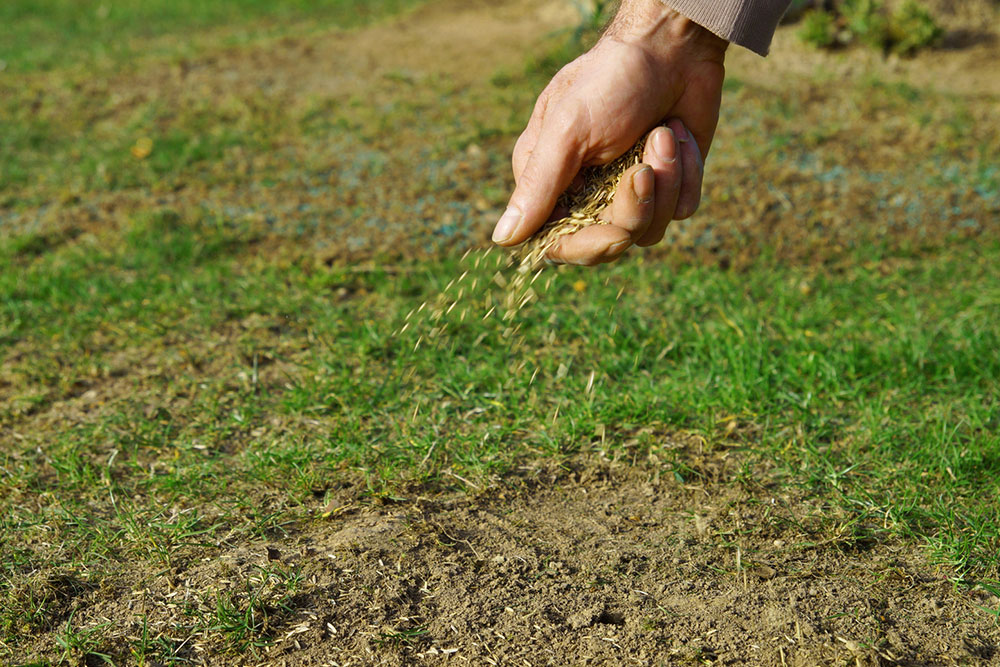Types of Grass Seeds and Lawn Care Tips
For most homeowners, maintaining a healthy lawn is a top priority, and proper lawn care can help achieve that goal. In regular lawn maintenance, grass seeds play a crucial role, as they determine how healthy the lawn is and how it looks. So, it is important to be careful while seeding the lawn. Alternatively, to ensure there are no problems with seeding, many may choose to hire professional lawn seeding services.

Types of grass seeds for lawn
Two main types of grass seeds exist, each promising favorable growth in certain regions. The warm-season type includes Bahia, Bermuda, Zoysia, and St. Augustine seeds, while the cool-season type includes Perennial Ryegrass, Fine Fescues, Kentucky bluegrass, and Tall fescue seeds. Choosing the best grass seeds for lawns depends on which part of the country homeowners reside in.
- Bahia grass seeds
This type of seed is known for its ability to thrive on nutrient-poor soils and for being low-maintenance. Unlike most other grass seeds, it grows quickly and does not need fertilization to stimulate the process. While it does not need much maintenance for growth, it does need regular upkeep to look uniform and aesthetically pleasing. Also, when Bahia grass is not managed optimally, it tends to develop seed heads. - Bermuda grass seeds
These seeds are the most common variants and can be used for both residential and recreational lawns to grow beautiful and smooth grass. It looks as good on football fields as it does on lawns and golf courses. Bermuda grass for lawns is resistant to heat and drought. Moreover, the grass that grows from these seeds can survive with just one inch of water per week. This type of grass is also very resilient, making it a good choice for lawns with children, pets, and heavy foot traffic. - Perennial Ryegrass seeds
This is the quickest-germinating lawn grass seed on this list. Perennial Ryegrass seeds can grow from scattered seeds to full lawn-sized grass in 21 days. On the downside, the grass from the seeds has a short lifespan. For that reason, most homes use this type as a temporary filler to patch up damaged lawns. The grass here also withers away as the warm season approaches. Also, this is a low-maintenance and pest-resistant variety of grass, which makes it an excellent choice for all kinds of lawns. - Fine Fescues seeds
This kind of seed is widely used for lush lawns. It is produced by blending multiple fescue seeds; that’s how its name was derived. The grass that germinates from this seed is known for its soft, fine texture, which is perfect for vibrant green lawns. In addition, the grass displays distinct foliage. One of the key highlights of this type of grass is that it is environmentally sustainable, as it requires minimal moisture and fertilization for its healthy growth and development.
Factors to consider while choosing grass seeds
Choosing the best type of grass seed can be challenging due to the varying climatic and environmental conditions across different regions of the country. So, when selecting grass seeds, one must consider three main factors: local climate, sun exposure, and appearance requirements.
- Climate
The successful cultivation of a particular type of grass seed in a certain location is highly influenced by the geographical and climatic conditions of that region. So, it is essential for homeowners to conduct thorough research to identify the right type of grass seed required for their lawn. Upon completing the research, seeking advice from professional lawn seeding services and botanical experts can also help one gain valuable insights and recommendations. - Sun exposure
Not all areas across the country receive bright sunshine all year long. So, a major factor to consider while selecting lawn grass seeds is whether the grass will thrive in different levels of sunlight. - Appearance
As mentioned earlier, aesthetics is a massive part of lawn care and grass seed selection. That’s why, depending on the desired appearance of the lawn, one must select grass seeds accordingly. Certain kinds of seeds produce softer grass with varying textures and shades of green. So, if one prioritizes soft and green grass in their lawns, selecting the particular seeds that produce the desired result is essential.
Lawn care tips
Regular maintenance of lawns is a time-consuming process that can leave one exhausted due to the amount of work needed to keep them healthy. But, following two main tips can help ease the process.
- Mowing lawn regularly
Homeowners must consider trimming their lawns at least once every week during summer and once every two weeks during other seasons, such as autumn, spring, and winter. The regular trim enables the grassroots to spread and grow, which further helps fill out gaps and block out weeds. - Watering the lawn
While watering plants to let them grow is hardly an insightful tip for lawn maintenance, one needs to be mindful of how much water they use for the purpose. Excessive use of water for lawns could lead to water seeping at rapid speed, blocking other elements like oxygen and nutrients from reaching the roots of grasses. On the other hand, watering too little defeats the purpose of watering the lawn entirely, as the roots will eventually perish without enough hydration.